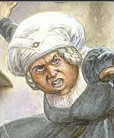FigwitBook Club Moderator & Misty Mountain MonsterPosts: 1966 Send Message |
|
FigwitBook Club Moderator & Misty Mountain MonsterPosts: 1966 Send Message |
|
| Aervir |
|
FigwitBook Club Moderator & Misty Mountain MonsterPosts: 1966 Send Message |
|
| RubySandybanks |
|
| LadyEowyn_Of_Rohan |
|
FigwitBook Club Moderator & Misty Mountain MonsterPosts: 1966 Send Message |
|
| RubySandybanks |
|
FigwitBook Club Moderator & Misty Mountain MonsterPosts: 1966 Send Message |
|
| RubySandybanks |
|
| Aervir |
|
FigwitBook Club Moderator & Misty Mountain MonsterPosts: 1966 Send Message |
|
| Aervir |
|
FigwitBook Club Moderator & Misty Mountain MonsterPosts: 1966 Send Message |
|
| RubySandybanks |
|
| Aervir |
|
| RubySandybanks |
|
FigwitBook Club Moderator & Misty Mountain MonsterPosts: 1966 Send Message |
|
 Author
Author








 6.I. The Tower of Cirith Ungol
6.I. The Tower of Cirith Ungol Nah, I'm sorry, just kidding.
Nah, I'm sorry, just kidding. Passages like this depict war as heroic, glorious, certainly fierce, but also noble. However, in the darkness of the orc tower, we get somehow back to the "reality" of cruelty, blood, dirt, and torture.
Passages like this depict war as heroic, glorious, certainly fierce, but also noble. However, in the darkness of the orc tower, we get somehow back to the "reality" of cruelty, blood, dirt, and torture. 


